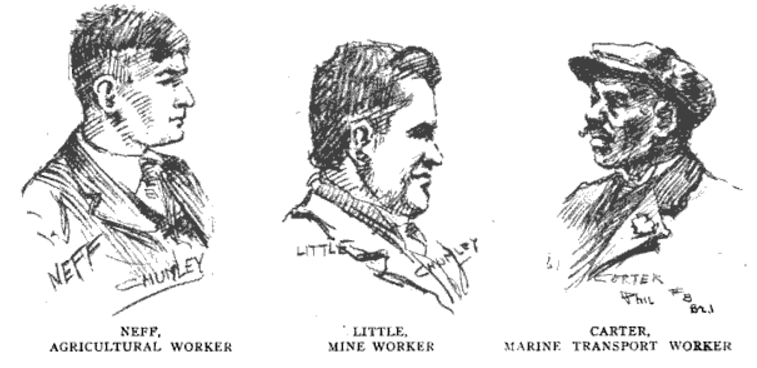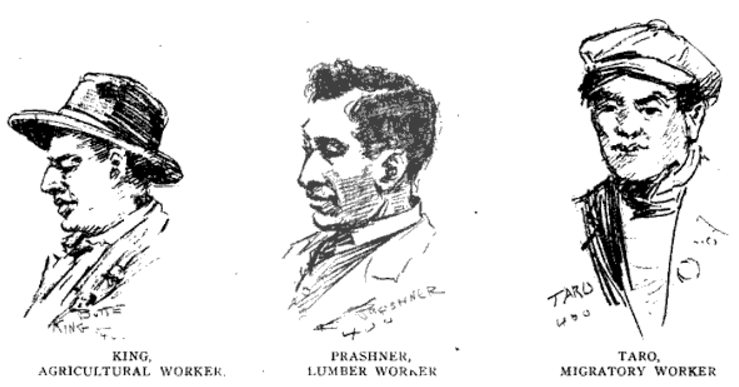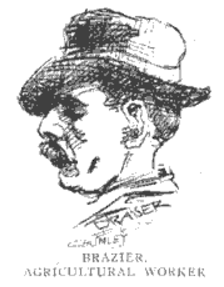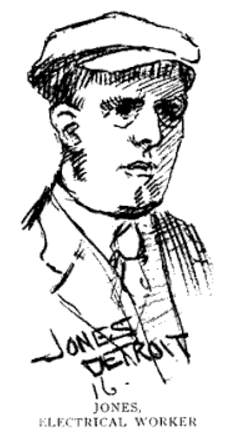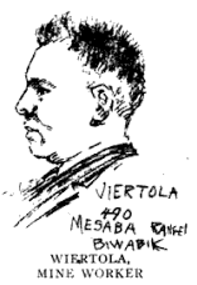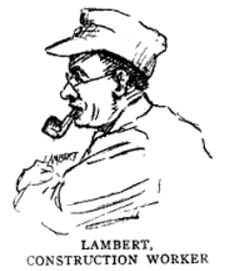
Hellraisers Journal, Friday February 9, 1917
Chicago, Illinois – I.W. W. Opposes War, Advocates Class Solidarity
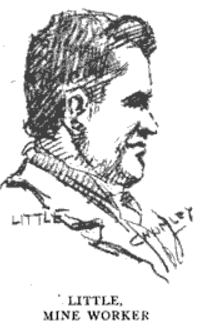
In the dark shadow of War, now looming over the nation’s working class men and women, we have concluded that now is a good time to consider the Resolution on War and Class Solidarity passed at Tenth Convention of the Industrial Workers of the World. The delegates gathered together in Chicago for ten days last fall, from November 20th to December 1st of 1916. Resolution #112 was passed during the afternoon session on the last day of the convention:
No. 112—A DECLARATION:
We, the Industrial Workers of the World, in convention assembled, hereby reaffirm our adherence to the principle of Industrial Unionism, and rededicate ourselves to the unflinching, unfaltering prosecution of the struggle for the abolition of wage slavery and the realization of our ideals in Industrial Democracy. With the European war for conquest and exploitation raging and destroying the lives, class consciousness and unity of the workers, and the ever growing agitation for military preparedness clouding the main issues and delaying the realization of our ultimate aim with patriotic and, therefore, capitalistic aspirations, we openly declare ourselves the determined opponents of all nationalistic sectionalism, or patriotism, and the militarism preached and supported by our one enemy, the capitalist class. We condemn all wars and, for the prevention of such, we proclaim the anti-militarist propaganda in time of peace, thus promoting Class Solidarity among the workers of the entire world, and, in time of war, the General Strike in all industries. We extend assurances of both moral and material support to all the workers who suffer at the hands of the capitalist class for their adhesion to these principles and call on all workers to unite themselves with us, that the reign of the exploiters may cease and this earth be made fair through the establishment of the Industrial Democracy.
F. H. LITTLE,
W. E. MATTINGLY,
FRANCIS MILLER,
WM. D. HAYWOOD.National Organizer McGuckin suggested that every effort should be made to get this published in the capitalist press, and that it should also be printed in leaflet form and widely distributed. Motion made and seconded that this be adopted unanimously, and published in the presses throughout the United States of America and the world. Unanimously carried.
[Emphasis added.]
From the International Socialist Review of January 1917:
The Tenth Annual I. W. W. Convention
IT TOOK twelve days of hard work, with a lot of overtime on committee work, to complete the most successful convention in the history of the Industrial Workers of the World. It met in Chicago on November 20th and the delegates were called to order by William D. Haywood, Secretary-Treasurer of the organization.
Almost all conventions look alike and act alike. A machine, composed of job holders, has a cut and dried program and policy which is to be put over, the delegates voting from time to time like so many dummies, when they are not busy pulling wires for pie cards.
But here was a convention that the onlooker felt was different—a spirit of democracy ruled the sessions. It was a rank and file convention. There was no caucusing in quiet corners. There was no playing politics on the floor, and the conventional steam roller would have been met with direct action by every delegate on the roll call.
One glance at the delegates told that it was a working class convention and they got down to business in a hurry. There were no squabbles or soap box speeches, there was no oratory by leading lights, because there were no leaders. Honest differences of opinion were thrashed out to harmonious conclusions, and although the agricultural delegates controlled the voting strength, by having 37 votes each, yet they voted as delegates with one vote apiece. There were only two roll calls during the long convention.
Perhaps the most important work accomplished was the structural changes in the form of organization. National Industrial Unions were abolished; they had not delivered the goods, and, therefore, went to the scrap pile. They will be supplanted by Industrial Unions directly affiliated with General Headquarters and by Industrial Unions with subordinate branches, such as the Agricultural Workers’ Organization.
A General Recruiting Union will be established with recruiting unions to function as a propaganda organizing machine at points where Industrial Unions have not been formed.
The job delegate method of organizing, so successfully worked out by the A. W. O., was unanimously endorsed by the delegates.
It was recommended that the office of General Organizer be abolished, as it never functioned.
Many radical changes will be made in the constitution, as the delegates fresh from the rank and file realize that they are taking part in a class struggle and that the organization must conform to the changing conditions of industrial development. If the proposed changes meet with the approval of the membership it will be because they consider them to be the best interests of the organization.
Solidarity and the Publishing Bureau, now located in Cleveland, Ohio, will be brought to Chicago in order to secure greater efficiency by being in close touch with General Headquarters. Ben Williams, who has served on the job many years as editor of the paper and manager of the Bureau, will retire as soon as his successor has been elected. Ralph Chaplin, Grover W. Perry and Justus Ebert are nominated by the convention and one will be elected by the membership.
The convention voted $5,000 to be held in trust by the General Office for work on the Mesaba Range, and a like amount to be used in defending members of the organization who are now in jail at Everett, Washington. Smaller sums were set aside to help out the foreign-speaking press, which is now growing rapidly.
Telegrams were sent to all prisoners of the class war in jails and penitentiaries, including faraway Australia. A telegram of condolence was also sent to Charmion London, wife of Jack London.
Many interesting resolutions were passed, the following being of especial interest to REVIEW readers:
A DECLARATION
We, the Industrial Workers of the World, in convention assembled, hereby re-affirm our adherence to the principles of Industrial Unionism, and re-dedicate ourselves to the unflinching prosecution of the struggle for the abolition of wage slavery, and the realization of our ideals in Industrial Democracy.
With the European War for conquest and exploitation raging and destroying the lives, class consciousness, and unity of the workers, and the ever growing agitation for military preparedness clouding the main issues, and delaying the realization of our ultimate aim with patriotic, and, therefore, capitalistic aspirations, we openly declare ourselves determined opponents of all nationalistic sectionalism or patriotism, and the militarism preached and supported by our one enemy, the Capitalist Class. We condemn all wars, and, for the prevention of such, we proclaim the anti-militarist propaganda in time of peace, thus promoting class solidarity among the workers of the entire world, and, in time of war, the General Strike in all industries.
We extend assurances of both moral and material support to all the workers who suffer at the hands of the Capitalist Class for their adhesion to the principles, and call on all workers to unite themselves with us, that the reign of the exploiters may cease and this earth be made fair throughthe establishment of the Industrial Democracy.
[Emphasis added.]
The most important report received by the convention was submitted by the General Secretary-Treasurer [William D. Haywood].
Total receipts for the year ending August 31, 1916, were $50,037.28, and disbursements for the same period amounted to $31,291.75, leaving a cash balance on hand September 1st of $18,745.53. A large number of old debts had been cleaned up and all bills were being paid promptly.
One hundred and sixteen charters have been issued to the workers in the various industries. Of these new unions, the Agricultural Workers’ Industrial Union, No. 400. has enrolled over 18,000 members, and maintains large headquarters at Minneapolis.
Metal Mine Workers’ Industrial Union, No. 490, with headquarters at Virginia, Minn., has added several thousand members during the recent strike on the Mesaba Range.
Many of the camps are organized to a man, as the miners appreciate the fact that they are not shackled with any time agreements or the check off system so much sought after by the U. M. W. A. and the W. F. M. In every mine the conditions have been materially improved, while the men are free handed to make demands when the time is ripe.
Prospects in the copper mines of the West are showing up fine. Unions are established in several camps in Arizona. At Cooper Hill, where a so-called organizer of the “Civilized Plain” type recently received some harsh treatment, the I. W. W. has a growing membership. The Mexicans of that state, who have always been discriminated against by workingmen and bosses alike, are showing pronounced activity in the organization, and will become earnest members of the I. W. W.
Coal mine workers in the anthracite regions of Pennsylvania, where the miners, organized and unorganized, are up in arms against the four years’ contract imposed upon them by the officials of the U. M. W. A., are becoming educated to the power they possess when organized in one big union. These miners are Polish, Lithuanian and Italian.
Railroad Workers’ Industrial Union, No. 600, has several delegates on the road and steady progress is being made.
Metal and Machinery Workers’ Industrial Union, No. 300, has been chartered and an active campaign planned for the coming year.
Textile Workers are reaping the benefits of the strikes conducted by the I. W. W. At Paterson, N. J., a nine-hour day has been secured. Wage increases have been made to the workers in the woolen mills of Lawrence.
Marine Transport Workers are showing renewed activity along the Atlantic Coast, on the Great Lakes and in all ports on the Pacific Coast.
The Lumber Workers united with No. 400 did splendid work for themselves last fall and winter, raising the wages in many places from $16 to $40 a month and board. This winter the lumberjacks are going to unite and put up a solid front to the boss, which will mean more money in the pay envelope and better living conditions.
The Delegate System has proved to be the most effective system of organizing. The delegates are organizers on the job under the control and responsible to a recruiting or industrial union which issues the credentials. Delegates are equipped with membership books, due stamps, constitutions, application blanks, report blanks and literature. They are empowered to initiate new members whenever they find them, making out their card, putting in stamps for dues paid, furnishing a report to the secretary for all moneys collected.
Strikes have occurred in many states and industries, with which REVIEW readers are more or less familiar. Many small strikes were won in short order, such as the Granite Workers at Lohrville, Wis., where the company was forced to discharge the superintendent and do a lot of other unpleasant things.
Papers and Literature: Solidarity, the official English paper, has had a desperate struggle, but is now on a sound footing. It will be greatly improved during the coming year. The Industrial Worker, at Seattle, Wash., is the most popular working class paper on the coast. It surveys the class struggle, talks working class talk and is on the job to stay.
The papers printed in foreign languages are: In Hungarian, A Bermankas; Italian, II Proletario; Polish, Solidarnos; Lithuanian, Darbininku Balsas; Russian, Rabochaya; Spanish, El Rebelde; Jewish, Industrial Unionist; Portuguese, A Luz; Swedish, Allarm; Slavonian, Industrijalni Radnik. These papers are doing splendid work.
The Secretary-Treasurer made many valuable suggestions as to the conduct of strikes, the necessity for expanding the educational work and carrying on the work of the organization.
Many earnest fights have been made by the I. W. W. to re-establish the right of Free Speech in the United States, notably at Sioux City, Iowa, and at Paterson, N. J., both ending in victory. The fight is now on in Everett, as all REVIEW readers know.
Defense: Hundreds of members of the organization have been imprisoned during the past year and the General Office has assisted to the limit of its ability in the defense. Several members charged with murder were acquitted. Meanwhile Charles Cline in Texas, Ford and Suhr in California, are still in prison, and the agitation to secure their release must be redoubled. More than a score have been murdered by hired gunmen.
In closing his report Fellow Worker Haywood said,
The principles of this organization are as sound and ring as true as worthy metal. The idea of The Industrial Workers of the World, founded as it is on the class struggle, is imperishable. Its ideals quicken the pulse and strengthen the heart of every member. Its members are to a remarkable degree free from all religious superstitions, no longer hoodwinked by political chicanery—looking upon the exploiter, whether a farmer, a small business man or a trust magnate, with a clear vision that recognizes a common enemy. Youthful, courageous, and full of vigor, this organization is facing a future teeming with fruitful possibilities.
SOURCES
Proceedings of the Annual Convention
of Industrial Workers of the World
Held at Chicago, Illinois
Nov 20-Dec 1, 1916
https://books.google.com/books?id=gjI4AQAAMAAJ
Afternoon Session, December 1, 1916-begins on page 135:
https://books.google.com/books/reader?id=gjI4AQAAMAAJ&printsec=frontcover&output=reader&source=gbs_atb&pg=GBS.PA135
Resolution No. 112 from Proceedings, page 138:
https://books.google.com/books/reader?id=gjI4AQAAMAAJ&printsec=frontcover&output=reader&source=gbs_atb&pg=GBS.PA138
The International Socialist Review, Volume 17
-ed by Algie Martin Simons, Charles H. Kerr
Charles H. Kerr & Company,
July 1916-June 1917
https://books.google.com/books?id=SVRIAAAAYAAJ
ISR January 1917
https://books.google.com/books/reader?id=SVRIAAAAYAAJ&printsec=frontcover&output=reader&source=gbs_atb&pg=GBS.PA387
“The Tenth Annual I. W. W. Convention” by Leslie H. Marcy
https://books.google.com/books/reader?id=SVRIAAAAYAAJ&printsec=frontcover&output=reader&source=gbs_atb&pg=GBS.PA406
IMAGES
All images are from article in ISR.
See also:
Hellraisers Journal: Chicago Federation of Labor Protests War in Response to Wilson’s Break with Germany
https://weneverforget.org/hellraisers-journal-chicago-federation-of-labor-protests-war-in-response-to-wilsons-break-with-germany/
Note: quotes in ISR article are not entirely as per proceedings. For a closer look at Haywood’s report see:
Afternoon session of November 22, 1916, begins on page 31:
https://books.google.com/books/reader?id=gjI4AQAAMAAJ&printsec=frontcover&output=reader&source=gbs_atb&pg=GBS.PA31
Quote from Haywood’s report:
Proceedings, page 38-
https://books.google.com/books/reader?id=gjI4AQAAMAAJ&printsec=frontcover&output=reader&source=gbs_atb&pg=GBS.PA38
Metal Mine Workers.
Another of the new unions, Metal Mine Workers’ Industrial Union, No. 490, chartered February 3, 1916, organized chiefly during the recent strike on the Mesaba Range, added some thousands to the general membership.
The headquarters of this union is at Virginia, Minn., with branches in the surrounding mining camps: Virginia, Biwabik, Eveleth, Gilbert, Chisholm, Kinney, Hibbing, Crosby, Aurora, Buhl, Winton and Keewatin. Some of these camps are organized to a man, with the workers in other industries lining up.
The unions in the iron mining country bids fair to become a permanent feature of the Industrial Workers of the World. None of these branches of the Metal Mine Workers are shackled with any time agreements or the check-off system so much sought after by the U. M. W. A. and the W. F. M. In every mine the conditions have been materially improved while the men are free-handed to make demands for betterment when the time is opportune.
Prospects in the copper mines of the west are showing up fine. Unions are established in several camps in Arizona.
At Copper Hill, where a so-called organizer of the “Civilized Plane” type recently received some harsh treatment, the I. W. W. has a growing membership. The Mexicans of that state who have always been discriminated against by working men and bosses alike are showing pronounced activity in the organization, and will become earnest members of the I. W. W.
Haywood closes his report:
Proceedings, page 48-
https://books.google.com/books/reader?id=gjI4AQAAMAAJ&printsec=frontcover&output=reader&source=gbs_atb&pg=GBS.PA48
The principles of this Organization are as sound and ring as true as worthy metal. The idea of the Industrial Workers of the World, founded as it is on the class struggle, is imperishable. Its ideals quicken the pulse and strengthen the heart of every member. Its members are to a remarkable degree free from all religious superstitions, no longer hoodwinked by political chicanery—looking upon the exploiter, whether a farmer, a small business man or a trust magnate, with a clear vision that recognizes a common enemy.
Youthful, courageous and full of vigor, this Organization is facing a future teeming with fruitful possibilities.
Trusting to see the time in our day when every worker will enjoy the full sunlight of life, I am,
Yours for Industrial Freedom,
WM. D. HAYWOOD,
General Secretary-Treasurer.

